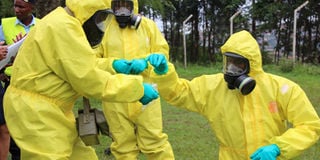30 get skills in protection against toxic chemicals

Participants showing the skills they have acquired in detecting toxic chemicals
What you need to know:
During the Arusha conference in 2005, Uganda volunteered to host the East African regional training on assistance and protection against chemical weapons, a program whose implementation started in 2016.
About 30 participants from the East African region were last week passed out at Uganda Rapid Deployment Capability Centre (URDCC) in Jinja District after acquiring skills in operational training in assistance and protection against toxic chemical incidents.
The participants, drawn from Burundi (7), Kenya (7), Tanzania (6), and largely from Uganda, gained skilled in detecting toxic chemicals and use of protective gear among others.
Brig Peter Omola, the Commandant URDCC, said: “The training has come at a time when the region is under the threat of terrorists who may resort to toxic chemicals.”
Mr David Mugisa, the Commissioner Occupational, Safety and Health Department in the Ministry of Gender, Labor and Social Development (MGLSD), said they need to have a specialized department with chemists to visit factories and demand for their raw materials for inspection.
“After this training, they will be able to enter any workplace to trace for any chemicals used in these industries and to monitor these chemicals closely that they are not turned into toxic chemicals.” Mr Mugisa said.
The Permanent Secretary MGLSD, Mr James Ebitu, said the training is much needed and as the government, they are ready to commit themselves in the training and raising awareness of toxic chemicals.
The participants received certificates and later demonstrated the skills they acquired in detecting of toxic chemicals, use of the equipment to the guests.
The ten-day training was organized by the Organisation of Prohibition of Chemical Weapons [OPCW] which has its headquarters in The Hague, the Netherlands.
The Ministry of Gender, Labour and Social Development [MGLSD] is the national coordination authority mandated to domesticate the convention.
Background
During the Arusha conference in 2005, Uganda volunteered to host the East African regional training on assistance and protection against chemical weapons, a program whose implementation started in 2016.
The key subjects of the training include identification of chemical warfare agents, basic emergency response procedures, detention methods and decontamination techniques, hot zone management, incident management and sampling.
First Responders from Uganda, Kenya, Tanzania, Burundi and Rwanda are eligible for this training which is aimed at protecting the region against any attacks involving any chemical.
It is also aimed at helping respective governments to develop local expertise in emergency response for chemical incidents and laboratory skills for the identification of chemical warfare agents.




